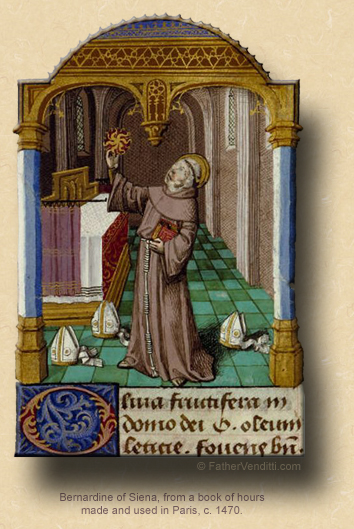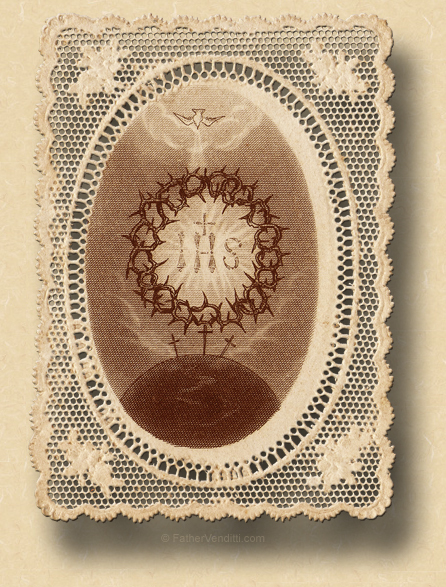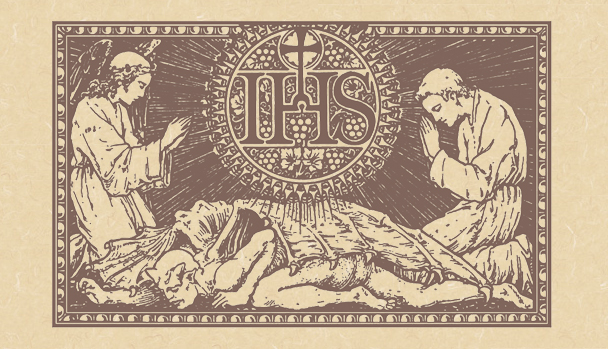What's in a Name? Sometimes Everything.
The Fifth Saturday of Easter; or, the Memorial of Saint Bernardine of Siena, Priest.
Lessons from the feria, according to the ordinary form of the Roman Rite:
• Acts 16: 1-10.
• Psalm 100: 1-3, 5.
• John 15: 18-21.
|
When the memorial is observed in Easter Time, the lessons are always from the feria as above.
|
The Third Class Feast of Saint Bernardine of Siena, Confessor.
First lesson from the common "Os justi…" of a Confessor not a bishop, Gospel lesson from the common "Os justi…" of an Abbot, according to the extraordinary form of the Roman Rite:
• Ecclesiasticus 31: 8-11.
• [The Gradual is omitted.]
• Matthew 19: 27-29.
Saturday of the Samaritan Woman; and, the Feast of the Holy Martyr Thaleleus.*
Lessons from the pentecostarion, according to the Ruthenian recension of the Byzantine Rite:
• Acts 15: 5-34.
• John 10: 17-28.
FatherVenditti.com
|
 6:32 AM 5/20/2017 — A few of you may remember my mentioning last year how the Blessed Apostle John, in his account of the life of our Blessed Lord, plays fast and loose with the chronology of events, compressing a public life of three years into one, and often rearranging events so as to follow certain themes. The Gospel lessons we've been hearing at Holy Mass all this week purport to come from our Lord's last discourse to His Apostles at the Last Supper, and today Saint John offers us the conclusion of this speech, in which our Lord reminds his disciples that the hatred the world has for Him will translate to whomever follows Him, so that they should expect to endure persecution. 6:32 AM 5/20/2017 — A few of you may remember my mentioning last year how the Blessed Apostle John, in his account of the life of our Blessed Lord, plays fast and loose with the chronology of events, compressing a public life of three years into one, and often rearranging events so as to follow certain themes. The Gospel lessons we've been hearing at Holy Mass all this week purport to come from our Lord's last discourse to His Apostles at the Last Supper, and today Saint John offers us the conclusion of this speech, in which our Lord reminds his disciples that the hatred the world has for Him will translate to whomever follows Him, so that they should expect to endure persecution.
Comparing these chapters of John's Gospel with the other three Gospels, it's pretty clear that Saint John has taken sayings and sermons said by our Lord at various times during His public ministry and inserted them into his Last Supper narrative in a form of poetic license;—it is unreasonable to assume that our Lord's Apostles could have sat through a dinner speech of this length without some sort of intermission—but, we must admit that, rearranged by Saint John, outside of their original context, our Lord's words do take on a whole new meaning. This is wholly consistent with the thematic thrust of John's Gospel, which is concerned not so much with presenting the facts of our Blessed Lord's life, as are the other three, but with serving more as a theological and spiritual reflection on the life of our Lord. John, after all, was the last survivor of the original twelve; his Gospel was written after most of his brother Apostles were dead. In the twilight of his years, he pens his Gospel, along with the Book of Revelation, to serve as a final testament to the meaning of our Lord's life on earth; and, many of the themes found in those books are mirrored by his own Epistles to the Churches that he had established.
So, in the Gospel lesson of today's Mass we come to what Saint John clearly regards as the punch-line: “If the world hates you, be sure that it hated me before it learned to hate you” (15: 18 Knox). And, if we take Saint John's method of taking these sayings out of context as inspired by God for a purpose—which we must, since it is a Gospel accepted by the Church—then we must accept, as well, the artificial context provided by John, which has a purpose different from the more chronological approach taken by the other Evangelists. John, after all, has already seen nearly all of his brother Apostles murdered by the enemies of Christ. He has already seen the various Churches they established ripped apart by dissension and heresy.  He has already seen the spectacle of Christians turning on one another, denouncing one another, appealing to Peter against one another. Part of that whole saga was presented to us all this week in the first lessons from Acts, which concludes the whole history of Paul, Barnabas and Cornelius converting the Gentiles, then having to defend their actions at the First Council of Jerusalem. He has already seen the spectacle of Christians turning on one another, denouncing one another, appealing to Peter against one another. Part of that whole saga was presented to us all this week in the first lessons from Acts, which concludes the whole history of Paul, Barnabas and Cornelius converting the Gentiles, then having to defend their actions at the First Council of Jerusalem.
So, when Saint John finally pens his Gospel, he's reflecting not only on the life of our Blessed Lord as he remembers it, but on everything that's happened in the life of the Church since, much of which was not pretty, reminding us that, if we choose to follow our Lord, ridicule and suffering will be our lot, but we are given grace to endure it because we know a glorious resurrection awaits us.
Which brings us to today's saint, Bernardine of Siena, of whom we spoke way back in January, just after the Octave of Christmas, on the feast of the Holy Name of Jesus. His full name was Bernardine Albizechi, and he was born in 1380 in Siena to a very noble family, but was known, even as a very young man, for his devotion to the Mother of God and for the poor: he spent a lot of time performing works of mercy and charity at the Santa Maria della Scala hospital in Siena. When he came to consider the religious life, he was led by God to choose the Franciscan order, in which he was known for his humility and patience, and in which he was ordained to the Holy Priesthood.
He suffered from a speech impediment which afflicted him with a very weak and hoarse voice, so he was a little agitated when his superiors, following that long tradition of thoughtful administration that persists in religious life even today, decided that he should devote himself to preaching; but, being an obedient friar, he applied himself to the task, and found that, as a result of his obedience, God blessed him with a cure of this handicap, and he became a very effective preacher, traveling all over Italy which, at that time, had fallen into a condition of spiritual and moral decline. He fought against this by focusing many of his homilies on the Third Commandment, “Thou shalt not take the name of the Lord thy God in vain” (Exodus 20: 7 Douay-Rheims); not because cursing was, by any means, the worst problem Italy was facing at the time, but because he wisely saw that any effective campaign at spiritual reform needed some sort of emblematic focus to serve as a launching pad, and he found it by preaching that devotion which we know today as the Most Holy Name of Jesus.
He was not a simple soul, but was a competent scholar quite versed in the Fathers of the Church, and took as an emblem for his preaching of the Holy Name an ancient monogram from the third century which appears to us to read “IHS.”  You see it often on the covers of books and missals, and you often see it embroidered on liturgical vestments. Everyone recognizes the monogram, but a lot of people don't know what it means; they either think it stands for something in Latin, or else they come up with their own bizarre theories. It's really very simple: it's the first three letters of the name “Jesus” in Greek. You see it often on the covers of books and missals, and you often see it embroidered on liturgical vestments. Everyone recognizes the monogram, but a lot of people don't know what it means; they either think it stands for something in Latin, or else they come up with their own bizarre theories. It's really very simple: it's the first three letters of the name “Jesus” in Greek.
Several times each day we pray the Hail Mary. It's official title, as you know, is the Angelic Salutation, and it comes from chapter one of Luke's Gospel, in which the angel Gabriel salutes the Blessed Virgin with the words: “Hail, thou who art full of grace; the Lord is with thee; blessed art thou among women” (Luke 1: 28 Knox). When it started to become popular as a prayer in the 11th century, the name of the Mother of God was inserted into it, and it started the take the form we know today: Ave Maria, gratia plena, Dominus tecum. Benedicta tu in mulieribus, et benedictus fructus ventris tui—“Hail Mary, full of grace, the Lord is with thee. Blessed art thou among women, and blessed is the fruit of thy womb.” But it was Bernadine of Siena, as part of his preaching about the Most Holy Name, who first added the Holy Name of Jesus to the end of that sentence, which is how we pray the Hail Mary today.
So, on his memorial today, let's include, in the intentions that each of us brings to this Holy Sacrifice, a prayer that the Most Holy Name of Jesus, so often used today in profane and godless ways, will be given the respect that the name of God deserves, so that the words of the Blessed Apostle Paul to the Philippians might be fulfilled: “At the name of Jesus, every knee should bend, of those in heaven and on earth and under the earth, and every tongue confess that Jesus Christ is Lord, to the glory of God the Father” (2: 10-11 NABRE).

* Thaleleus was a Labanese physician martyred in Silicia in 284.
|

